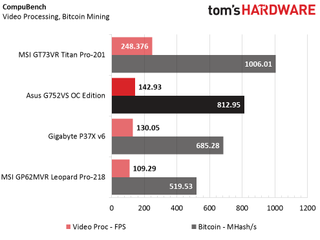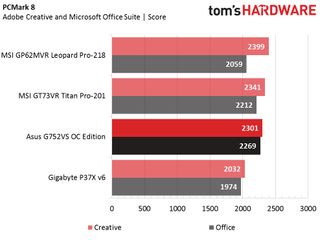Asus G752VS OC Edition Gaming Laptop Review
Why you can trust Tom's Hardware
Synthetic and Productivity Benchmarks
Today's review compares Asus' G752VS OC Edition to three other Pascal-equipped systems: the Gigabyte P37X v6, MSI's GT73VR Titan Pro-201, and the MSI GP62MVR Leopard Pro-218. We’ll be reviewing these systems as well, so stay tuned!
The P37X v6 features an Intel Core i7-6700HQ, 16GB of DDR4-2400 memory, an Nvidia GeForce GTX 1070, a 512GB SSD, and 7200 RPM 1TB HDD. The Titan Pro is equipped with a Core i7-6820HK, 64GB of DDR4-2400 memory, a GTX 1080, two 512GB SSDs running in RAID 0, and a 7200 RPM 1TB HDD. Finally, the Leopard Pro-218 features a Core i7-6700HQ, 16GB of 2133 MT/s memory, a GTX 1060, and a 7200 RPM 1TB HDD.
3DMark
3DMark is primarily GPU-dependent, so it should be no surprise that the G752VS OC Edition finishes behind MSI's Titan Pro-201 and its GTX 1080. Asus bests the Gigabyte P37X here because of its stronger processor and additional memory.



Cinebench R15
Cinebench measures CPU rendering power as well as GPU performance with OpenGL.
As expected, the G752VS OC Edition and MSI Titan Pro-201's opposing Core i7-6820HKs score within single percentage points of each other in the processor-based sub-tests. The Titan Pro-201 GTX 1080 eclipses Asus' GeForce GTX 1070 when the workload switches to graphics, however.

CompuBench
We use CompuBench's Video Composition and Bitcoin Mining test to determine a system's video processing and integer performance. Both are influenced by the system's CPU and GPU. Our G752VS OC Edition takes second place against the Titan Pro-201.

Disk Speed
Disk Speed is used to measure a system’s random and sequential read/write speeds. 4KB random transfers are measured in IOPS, while 128KB sequential transfers are measured in MB/s. We run Disk Speed at queue depth of two (QD2) on the system's primary drive, recorded over four minutes of activity. Products based on TLC flash will show realistic, degraded performance.
In this case, it's a 256GB Toshiba THNSN5256GPU7 NVMe SSD in the Asus laptop. The Gigabyte P37X v6 has a 512GB Samsung SM951 SSD, and the MSI Titan Pro is equipped with two 512GB Samsung SM951 SSDs in RAID 0. Meanwhile, the MSI Leopard Pro has a 7200RPM 1TB HGST Travelstar 7K1000 HDD.
Asus' Toshiba drive takes the lead against the P37X v6's SM951 in 4KB random reads and writes, but falls behind in 128KB sequential transfers. The Titan Pro's RAID 0 configuration takes first place overall. The Leopard Pro finishes far behind the competition, for obvious reasons.




PCMark 8
Our PCMark 8 tests use Adobe Creative Suite and Microsoft Office Suite workloads to mimic the type of usage a PC may experience during a typical home, office, or creative workload. Initially, our Asus laptop outperformed the MSI Titan Pro in both the Adobe Creative and Microsoft Office workloads, which is highly unlikely considering the hardware each one packs. With more memory and a stronger GPU, the MSI Titan Pro should've outperformed the G752VS.
Initially, we ran our benchmarks on a stock Windows image without the manufacturer's tuning software installed, so we revisited these tests after installing both Asus' ROG Gaming Center and MSI's Dragon Gaming Center, and allowing the software to automatically control each system's fan curve. Sure enough, the Titan Pro scores higher in the Adobe Creative workload. Meanwhile, the CPU and storage-oriented Microsoft Office workload pegs the Asus slightly higher, but within the margin of error, given that these systems have the same CPU and HDD.
Also note that, after repeated tests, the Leopard Pro stubbornly outscored all of the higher end systems. We'll revisit the results in the future if anything changes.

Current page: Synthetic and Productivity Benchmarks
Prev Page Introduction And Product Tour Next Page Gaming BenchmarksStay on the Cutting Edge
Join the experts who read Tom's Hardware for the inside track on enthusiast PC tech news — and have for over 25 years. We'll send breaking news and in-depth reviews of CPUs, GPUs, AI, maker hardware and more straight to your inbox.
-
spacebro This looks like a muscle car. I want to look at one of these in person. I could use my 2016 macbook pro budget on this and have over $1000 left over. The specs on this completely wreck the 2016 macbook pro. I like how gaming laptops are starting to look more streamlined and less juvenile, almost perfect for those looking for a workstation who do not need a quadro.Reply -
itsmedatguy Spacebro I'd take a look at Sager/Clevo laptops. I've heard they've got great build quality, and they're a lot cheaper than the competition.Reply -
CN Shana These are definitely great laptops, I have last years G752-VT with a 970m, 256gb ssd, and 1tb hd, and i've been one happy customer, still have had windows 10 issues sadly..... but the laptop itself has been a smooth ride.Reply
I can assure you guys though, it's worth waiting a bit, you can pick up any of these laptops at around 500-800$ less in june/july, because at that point asus is already ceasing some manufacturing of them and is already working on the next batch of laptops for that years fall(2017).
I paid 2,099$ for mine and in july it was on the website for 1599$ thats a big jump for only about 8 months of waiting. -
lunyone I would love to have one of these, but the price is a bit too much for me. If the price was in the $1,600-1,800 price range it would make more sense, but with the build quality (from what I've seen) you are paying for it.Reply -
jongri I wouldn't consider buying this notebook. I'd rather wait & pay more for theReply
ASUS ROG G? w/ GTX 1080 NOTEBOOK! -
wifiburger i'm always amused at these chassis, they look stupid, looking back at an old XPS gaming system that XPS looks like a macbook compared to these current gaming notebooksReply -
SpAwNtoHell At the moment looks to me as the only gaming laptop with cons that you can live with...Reply